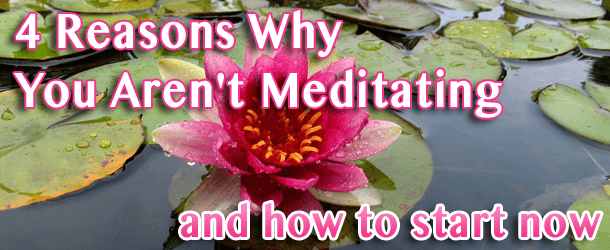
I was 19 years old when I started my meditation practice. Dr. Herbert Benson’s book, The Relaxation Response gave me a solid overview of the benefits of the practice. The author, a Harvard professor, approached the practice from a medical point-of-view, which aligned with my scientific-leanings. He shared about meditation’s ability to improve one’s cardio-vascular health, and although that intrigued me, my 19 year-old-self wasn’t overly concerned with lowering my blood pressure and heart rate. When I look back, I’d characterize my practice at that time as intermittent.
My practice became more serious when I started meeting people who had been long time meditators. They shared how it promoted emotional and spiritual development, not just physical health. I’d always been into personal growth, so hearing how meditation could accelerate my spiritual evolution was a definite turn on. As a result, I began meditating every day–morning and evening. And the more I noticed my growth, the deeper my commitment became. So if meditation is such an amazing tool of personal transformation, why aren’t more people doing it? In this article, I’ll provide 4 common reasons why people are resistant to begin a regular practice:
Reason 1: I have no reason to meditate
Figuring out the “why” behind your practice is one of the most important ways to motivate yourself to maintain a consistent practice. If you really don’t have a reason to meditate, then what’s the point? Exercise is similar. If you don’t have a reason to go to the gym, why do it? But if you know that it adds years to your life, keeps your weight down, and gives you a surge of endorphins afterwards…well those are pretty compelling reasons!
———————-
Check Out Dr. Puff’s Meditation Guide for Beginners
———————-
If making money, going out, socializing, and working longer hours than is necessary are your top priorities, then meditation will probably happen once in a while, at best. But if you realized that meditation would increase your happiness and spiritual well being in excess of other activities that currently rank high on your list, then your practice will take on greater importance.
Reason 2: It’s too difficult!
When we start out meditating, it can be a huge challenge to quiet our minds. You’ll often hear the mind chatter referred to as monkey mind. Monkey mind can be very distracting and disheartening. Your body may not really like sitting still either. It takes practice to sit without fidgeting and to bring our minds to a peaceful state. So give yourself a break. Don’t be critical with the struggles, and trust that the experience will improve with consistent practice.
One simple way to initiate you into the practice is to follow a guided meditation. Beginners often benefit from meditations where they listen to someone speak as they sit. The people facilitating your meditative session are like training wheels on a bike. Once you learn how to do it yourself, you can go solo without any assistance.
Reason 3: I don’t like to be alone
The thought of sitting alone for extended periods of time is very uncomfortable for many. When we meditate, we learn more about ourselves and what makes us tick. Emotions and past experiences may arise that we’ve ignored. We may recognize aspects of ourselves that are difficult to acknowledge and hidden thoughts that we’ve suppressed. Not exactly the picture of tranquility!
An important aspect of meditation is that the practice doesn’t lie. If we have repressed feelings, they’ll come up. If we’ve been ignoring past hurts and traumas, meditation will make them loud and clear. Being faced with painful feelings may make you want to get up and stop meditating right away. But I can’t stress enough how important it is to work through negative experiences from the past. In fact, that’s what motivated me to write my first book, Anger Work: How to Express Your Anger and Still Be Kind. The book is focused on healing from past traumas. Working through past negative experiences is also one of the key reasons that I recommend that all my clients in my private practice meditate because it’s a powerful healing tool.. It facilitates the work we do in talk therapy. Furthermore, meditation is a reliable barometer to measure your healing progress. If you can be still and present with yourself, then you’re probably doing well.
Reason 4: I’m not disciplined
Here’s a simple solution: set your alarm thirty minutes ahead of your normal wake up time. Then meditate half an hour before you go to bed. I find that it’s most effective to meditate at the beginning and end of the day, as opposed to squeezing in when it’ll fit into your busy schedule. But if you can’t accommodate meditation throughout the day, then do what works best for you. As you experience the benefits of meditation, you’ll look forward to the thirty minute periods set aside just for you.
If you’re looking for guided meditation, you can find them for free on my meditation podcast in the links below. These weekly guided meditations may be the tool to get you started on a journey full of wonder, beauty, and bliss.
– Dr. Robert Puff
Dr. Robert Puff, Ph.D. is a clinical psychologist, author, international speaker, and meditation expert who has been counseling individuals, families, nonprofits, and businesses for over twenty years. A contributing writer to Psychology Today, he has authored numerous books and creates a weekly podcast on happiness at http://www.HappinessPodcast.org He also creates a weekly podcast on meditation, http://www.MeditationForHealthPodcast.com and a weekly podcast on spiritual enlightenment, http://www.EnlightenmentPodcast.com
His retreat schedules can be found at http://www.HolisticRetreats.tv You also might find his blog useful at http://www.Meditation-Enlightenment.com
If you are interested in having Dr. Puff speak to your organization or company, you can learn more about his speaking services at http://www.SuccessBeyondYourImagination.com

